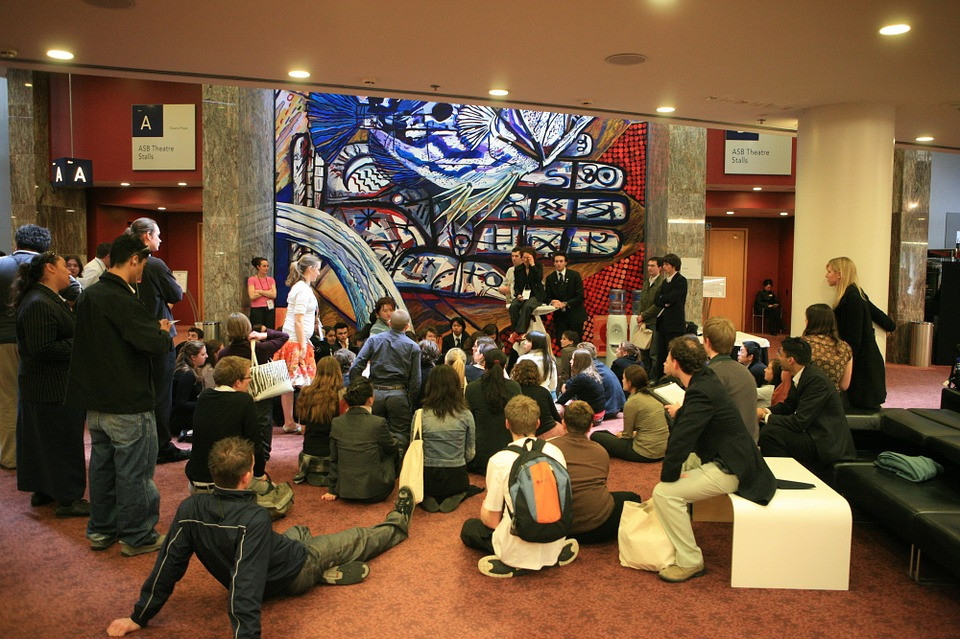What You Want From New Dream: Key Themes and Messages on Equity and Consumption
January 14, 2019

Last November, we sent out a survey about our renewed focus on equity and consumption and asked you—our audience—for comments and suggestions.
And wow, did you respond!
Read on to learn more about what your fellow New Dreamers think about the connections between consumerism, class, and race; our new focus on equity and consumption; and what you’d like to see from New Dream in the future.
You want more knowledge and information
Many of you are interested in learning more about how your consumer habits relate to broader issues of equity and diversity. Some of you admit that you haven’t given much thought to these connections, but agree that it’s a perspective worth exploring.
“I am largely ignorant regarding how those around me view consumerism or their purchasing power [and] how it relates to equity…. I have considered it, but it doesn't enter into my everyday thinking as a consumer.”
Income level/class, race
In particular, many of you are interested in learning more about how factors like income level, economic class, education level, and racial or ethnic background influence what and how much we consume, as well as the varied impacts of this consumption on different populations. For example, you’ve asked:
- How do economic and racial variables influence our choices as consumers and our ability to make a difference in changing our consumption habits?
- Do wealthy people of all races (whites, Asians, African Americans, etc.) tend to consume at similar levels, or are there differences that can be attributed to race, ethnicity, culture, etc.?
- How do we tackle the challenge of too little consumer choice, particularly among those who struggle to meet basic needs? Many people have only limited control over what they consume and may only be able to afford cheap, plastic, toxic items and less healthy foods rather than high-quality, longer-lasting, environmentally preferable, and healthier items.
- How do we raise awareness among people who, often unknowingly, make their consumption choices from positions of “privilege” (economic, racial, etc.)? Similarly, how do we raise awareness and encourage action among people who don't want to think of problems in terms of race and class and who won't accept that they have a form of privilege?
“I'm struck by the difference between living with limited means as a conscious and community-affirmed choice, versus living with limited means because of not having other choices and having no source of community affirmation. While the results can be materially similar, psychologically and socially they are polar opposite positions to be in.”

Societal influences: culture/religion/media/marketing
In addition, many of you want to learn more about cultural and societal influences on our consumption habits and on the choices we make. For example, you’ve asked:
• What role does our increasingly fast-paced culture play in creating the immense pressure to consume things that are easy, convenient, and save the most time possible?
• To what extent are marketers and the media to blame in shaping how people define “success”?
• What role do parents play in influencing their children's expectations of what is enough?
• Are religion and ethics a factor in how much or how little someone consumes?
• What social or psychological factors might encourage people to desire only the newest trends, and to purchase brand-new items rather than secondhand or used?
Some of you point to the systemic nature of inequity, and to the need for deeper change at the systems level to tackle these issues. You mention the need for more equitable access to resources, education, materials, and community spaces such as recreation centers, libraries, and other places where people feel safe. You also recognize the need for effective education and media literacy as a key way to neutralize the impacts of insidious marketing and advertising. Some of you advocate for alternative lifestyle and livelihood options such as worker cooperatives and socialized living arrangements to help level the playing field.
“[It's important to] think in terms of voluntary simplicity and how we can make the case for it simply out of respect for those who have less. It's embarrassing to have so much stuff knowing that there are those who have barely anything.”
You want more voices and more stories
Almost all of you asked us to share a wider range of voices to showcase how your consumption choices may affect others. You want to hear from communities whose voices are not often included in these conversations. You also want to learn why and how people from different backgrounds come to “alternative” consumption choices, such as consciously limiting their consumption. You want to learn new ways of seeing the world “from other people’s shoes.”
“Based on my self-identity… I think this is a time for me to do more listening than talking, and I'm looking forward to doing that and helping where I can.”
Beyond the middle class
It’s clear that many of you are frustrated with today’s “green” and “minimalist” movements, which are targeted mainly at the middle class and tend to exclude people of lesser means from the conversation. Some of you wonder what kind of message is being sent when most of the prominent voices in the anti-consumption movement are white, middle-class suburbanites whose concerns may not be relevant to large segments of the population.
Solutions such as zero waste, “downshifting,” and protecting the environment may be useful in mobilizing certain demographics, but these solutions often require extra time or money that are out of reach for the average or lower-income American. You’ve made it clear that, in offering actionable solutions, New Dream needs to meet folks where they’re at.
“Public transit? Only if you live in a progressive city and don’t work shift work. Buy organic? Expect to pay for it. Cook from scratch? Not if you're a single mom and want to sleep.”
At New Dream, we hear your message that we need to include more diversity of all kinds in the consumption conversation. Sustainability and resource savings need to be communicated across the social spectrum, but in ways that recognize the many different perspectives that people are coming from. All of us need to better understand how to communicate and build relationships with people and communities that have “differences,” and to respect and appreciate the challenges and choices they face in their communities.
You want practical ways to take action

As active and committed New Dreamers, you don’t just want information, you want actionable tools to help you change your practices, tackle systemic challenges, and make the world better! You’ve questioned whether our goal as an organization is simply to help you better understand the equity challenges associated with consumption, or whether it’s to spur advocacy and action to help level the playing field.
You want to know what you can tangibly do with the information we provide (especially when you’re on a budget). You’ve asked us for:
- Actionable, community-focused programming that would directly impact your lives and the lives of others.
- Resources to help you become more equitable consumers, whether it's information on where to shop or what to buy.
- Everyday steps that you can take to help lessen these problems.
- Policy solutions that you can support and advocate for that reduce consumption and create greater time and equity (for example, basic income, paid parental leave, etc.).
“I want to know that when I do spend money, it's helping real people make a living and lift out of poverty—in a deep and meaningful way, with real impact on systems.”
How can New Dream best share your stories and voices, and encourage meaningful and effective action?
You’ve proposed various channels such as articles, infographics, videos, soundbites, youth campaigns, web content, online/word of mouth, “printables,” posters, etc. You’ve suggested charts and videos with research and statistics geared toward adults and children. You’ve suggested a video on the topic of consumption and equity, as well as quick, one-minute interviews with a range of people stating their definitions of “excess consumerism.” These are all great ideas for content that we’ll be working on over the coming years!
Most of you support our renewed focus on equity, but not all of you do
The vast majority of you support our renewed focus on equity, although a handful expressed concern. Some of you have long been committed to tackling issues of racism, oppression, and inequity through your own work and have expressed your excitement in seeing New Dream actively consider intersectionality as a framework. We thank you for your support!
“I have been deeply concerned about, and actively working on, wildlife and habitat conservation and issues faced by marginalized people for years. It is comforting to know that I am not alone. New Dream constantly inspires and invigorates me.”
However, others of you see our renewed focus as divisive, claiming that it politicizes the issue too much and will lead to a perception that New Dream is for “liberals” and “democrats.” You note that while equity is a high value for liberals, it is not a top value for conservatives, so as an organization we need to be careful in framing the discussion in a way that resonates with all audiences. Ultimately, we need to convey the reality that this work is important for all of us, regardless of our political leanings.
Some of you are concerned that New Dream is “losing sight” of its core focus on individual, family, and community actions and the ripple effects that these can have. You question whether equity needs to be a top-level thrust of the organization because this might dilute the core messages about consumption that are unique to New Dream, and could risk the organization getting lost in the crowd of other equity-focused organizations.
Finally, some of you have stated that the topic of equity and consumption simply doesn’t interest you. While you recognize the value in appreciating “differences,” you feel that the national discourse today is already too heavily focused on race, gender, and class. You hope that New Dream doesn't shift too far away from its cooperative, environmental feel: “We are all human and maybe should focus on behaviors that benefit all of us.”
Our promise to you
Rest assured that, through our renewed focus, we aim to be more effective in our work, not less. By acknowledging the impacts of consumption on people of all backgrounds and circumstances, as well as on the planet, we hope to approach our task in a more genuine, inclusive, and impactful manner. We firmly believe that only by recognizing and appreciating the role of equity in this important work will we truly be able to achieve a more livable and sustainable world.
“I love knowing that I can play a part in improving things through New Dream and other organizations.”
Didn’t get a chance to comment on our survey? You can access it here and share your thoughts and suggestions.

